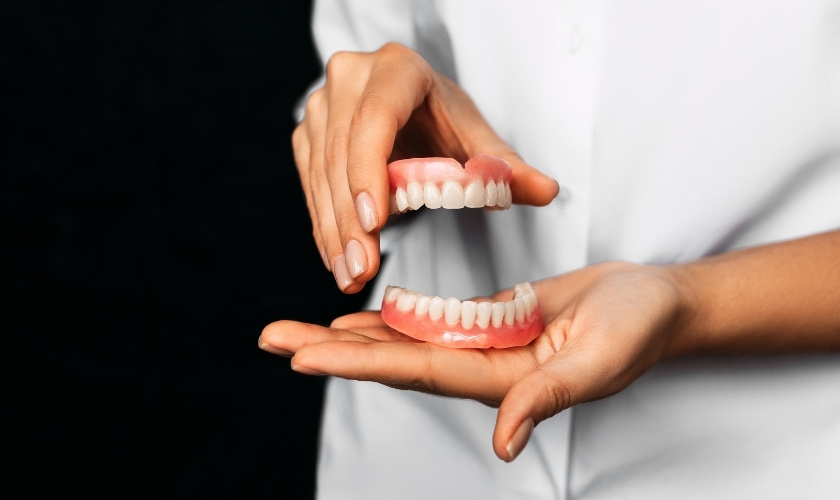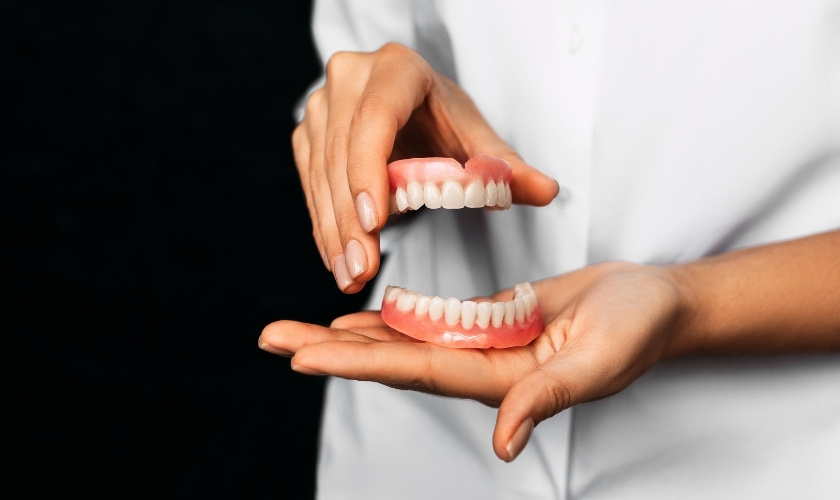$29 Emergency Exam - Walk-Ins Welcome - Same-Day Dental Appointments Available

Dentures are a crucial dental appliance for individuals who have lost their natural teeth for various reasons, such as decay, injury, or age-related issues. These prosthetic devices are designed to restore functionality and aesthetics to the mouth, enabling individuals to chew, speak, and smile confidently. However, despite their durability, dentures can sometimes break or become damaged, causing inconvenience and discomfort to the wearer.
In this guide, we’ll explore everything you need to know about fixing broken dentures, from common causes of damage to expert repair techniques.
Common Causes of Denture Damage
Dentures can break or become damaged due to a variety of reasons, ranging from accidental trauma to everyday wear and tear. Some of the most common causes of denture damage include:
- Accidental Dropping: Dropping dentures, especially on hard surfaces, can lead to cracks, fractures, or even complete breakage.
- Improper Handling: Rough handling or incorrect cleaning techniques can weaken the structure of dentures over time, making them more susceptible to damage.
- Poor Fit: Ill-fitting dentures can exert excessive pressure on certain areas of the mouth, leading to stress fractures or breakage.
- Natural Wear and Tear: With regular use, dentures can experience gradual wear and tear, including deterioration of the acrylic material or weakening of the metal framework.
Understanding the common causes of denture damage is essential for taking preventive measures and minimizing the risk of future issues.
Assessing the Damage: What to Look For
Before attempting to repair broken dentures, it’s crucial to assess the extent of the damage and determine whether professional intervention is necessary. Here are some key signs to look for when inspecting broken dentures:
- Visible Cracks or Fractures: Inspect the dentures carefully for any visible cracks, fractures, or chips in the acrylic or metal components.
- Loose or Misaligned Components: Check for any loose or misaligned teeth, clasps, or other components that may indicate structural damage.
- Difficulty in Chewing or Speaking: If you experience discomfort, difficulty chewing, or changes in speech while wearing your dentures, it could be a sign of underlying damage.
- Changes in Fit or Comfort: Pay attention to any changes in the fit or comfort of your dentures, such as sore spots or irritation, which may indicate a need for adjustments or repairs.
By thoroughly assessing the damage, you can determine the best course of action for restoring your dentures to their optimal condition.
DIY Denture Repair Tips
While some cases of denture damage may require professional repair by a qualified dentist or prosthodontist, minor issues can often be addressed at home using DIY repair kits or household materials. Here are some effective DIY denture repair tips to try:
- Temporary Fixes with Denture Adhesives: In cases of minor cracks or fractures, temporary fixes can be made using denture adhesives or repair kits available at pharmacies or online. These products can provide a quick and convenient solution until professional repairs can be arranged.
- Use of Dental Wax or Glue: Dental wax or glue can be used to temporarily seal cracks or secure loose components until proper repairs can be made. However, it’s essential to follow the manufacturer’s instructions carefully and avoid using household adhesives that may contain harmful chemicals.
- Avoid DIY Metal Welding: While it may be tempting to attempt DIY metal welding to repair broken metal dentures, this should be avoided, as it requires specialized equipment and expertise. Improper welding can further damage the dentures and compromise their structural integrity.
- Seek Professional Advice: If you’re unsure about how to repair your broken dentures or if the damage is extensive, it’s always best to seek professional advice from a qualified dentist or prosthodontist. They can assess the damage and recommend the most appropriate repair options based on your specific needs.
While DIY denture repair techniques can provide temporary relief, they should not be viewed as a long-term solution. It’s essential to seek professional dental care for comprehensive assessment and repair of broken dentures to ensure optimal function and longevity.
Professional Denture Repair Option
When it comes to fixing broken dentures, professional intervention by a qualified dentist or prosthodontist is often the safest and most effective option. These dental professionals have the expertise, experience, and specialized equipment necessary to repair dentures accurately and restore them to their original condition. Here are some common professional denture repair options:
- Denture Relining: Denture relining may be recommended if your dentures no longer fit properly due to changes in the shape of your mouth or gums. This involves adding a new layer of acrylic to the inner surface of the denture to improve fit and comfort.
- Denture Rebasing: Similar to relining, denture rebasing involves replacing the entire acrylic base of the denture while retaining the existing teeth and framework. This can help address structural issues and improve the stability and longevity of the dentures.
- Denture Repair and Reconstruction: In cases of significant damage, such as multiple fractures or broken teeth, denture repair and reconstruction may be necessary. This involves repairing the damaged components or replacing them entirely to restore the functionality and aesthetics of the dentures.
- Professional Cleaning and Maintenance: Regular professional cleaning and maintenance of dentures are essential for preserving their integrity and prolonging their lifespan. Dentists can use specialized equipment and techniques to remove plaque, tartar, and stains, ensuring optimal oral health and hygiene.
By opting for professional denture repair options, you can ensure that your dentures are restored to their optimal condition and continue to provide you with comfort, functionality, and confidence in your daily life.
Preventing Future Damage
While accidents and wear and tear are inevitable, there are several steps you can take to minimize the risk of future damage to your dentures:
- Handle with Care: Always handle your dentures with care, avoiding rough or forceful handling that could lead to fractures or breakage.
- Clean Regularly: Clean your dentures daily using a soft-bristled brush and denture cleaner or mild soap. Avoid using abrasive cleaners or toothpaste, as these can damage the denture material.
- Store Properly: When not in use, store your dentures in a denture-soaking solution or plain water to prevent them from drying out or warping. Avoid exposing them to extreme temperatures or direct sunlight, as this can cause damage.
- Attend Regular Check-ups: Schedule regular check-ups with your dentist to ensure that your dentures are in good condition and fit properly. They can make any necessary adjustments or repairs to maintain optimal comfort and function.
By following these preventive measures and practicing proper denture care, you can prolong the lifespan of your dentures and minimize the need for frequent repairs or replacements.
In conclusion, dealing with broken dentures can be a stressful and inconvenient experience, but with the right knowledge and resources, it’s possible to address the issue effectively. Whether you opt for DIY repair techniques or seek professional intervention, understanding the common causes of denture damage and knowing how to assess and address the issue
FAQs:
Yes, dentures can crack over time due to wear, accidental drops, or changes in fit. Regular check-ups and proper care help prevent damage. If they crack, don’t DIY—see your dentist for a repair or replacement!
Eating with a cracked denture isn’t a good idea! It can worsen the damage, cause discomfort, and even hurt your gums. Call your dental specialist ASAP—it’s better to fix it now than deal with bigger problems later!
For small cracks, a repair kit may help temporarily, but a dentist should fix it properly. Avoid super glue! If badly broken, visit me ASAP—I’ll restore your dentures for a perfect fit!


